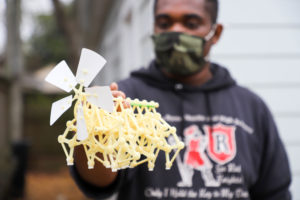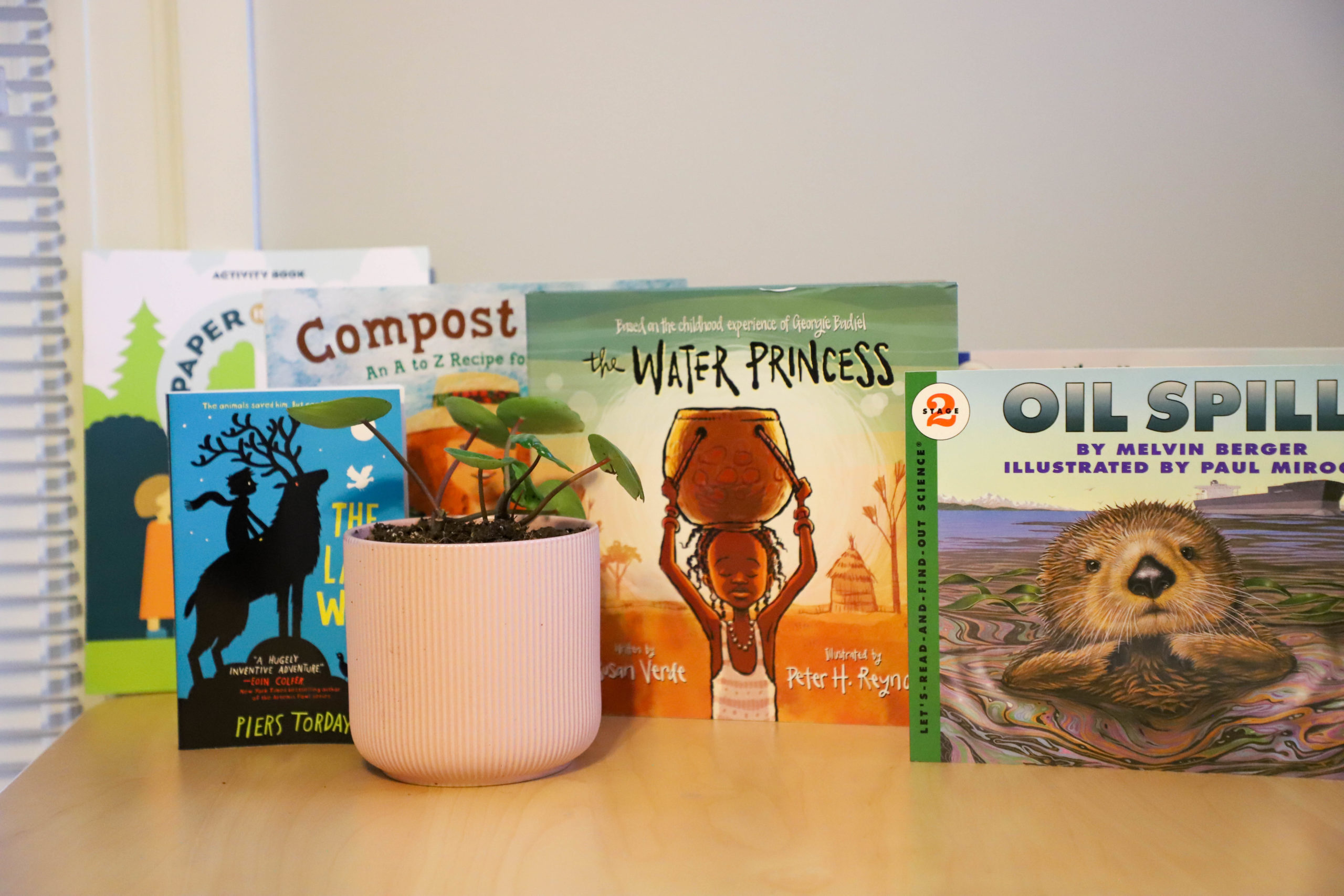Sharing Sustainability through Schools Creates Homegrown Heroes
Interviewed and written by Meridith Miller Rucker
“Not all heroes wear capes” is a recycled quote, but fitting for Michelle Cowan, the Education Director for Clean Memphis who is championing practices of recycling, reducing, and reusing with Memphis youth during one of the most challenging and unprecedented academic years in modern history. Across the country, as the school year ends this month, educators are reflecting on whether their Covid 19-era programming made the marks. With the pandemic bringing traditional modus operandi to a halt, schools that embraced creative virtual learning opportunities scored big. Enter Cowan who leads the organization’s commitment to educating youth and her programming that is not only providing students with engaging and fun environmental science lessons but also helping grow the next generation of service-minded Memphians who are passionate about preserving the planet.

“We’re trying to create a lasting impact,” Cowan said. “We have found, and research shows, that environmental science is engaging and relatable. It’s empowering when young people learn that they can make a difference.”
The mission of Clean Memphis is to educate youth, engage leadership and empower communities toward a cleaner Memphis. For Cowan, whose background is in middle school math and science, the work started with her and her team working in Memphis schools and teaching hands-on lessons.
“We used to bring wagons full of supplies [to schools],” Cowan said with a bright smile when recalling their early efforts. “We had over 12,000 visits to students. Many of those visits were to support youth in poor, under-resourced neighborhoods where schools might have what they need, but they don’t have what they want.”
During this time, they developed a partnership with Compass Schools, a Shelby County Schools charter network focused on serving 1300 students across six campuses in areas where neighborhood schools have closed, and children might otherwise be left behind. Cowan taught fourth-grade service learning to four of the Compass schools including Frayser, Binghamton, Orange Mound, and Hickory Hill. The curriculum was environmentally centered, and Cowan immediately sought ways to make deeper programmatic connections that would benefit the students and the city. And then Covid 19 forced everyone to regroup.
According to Cowan, when stay-at-home orders went into effect, Compass moved quickly and dropped off each student’s chrome books to their homes in March of 2020. The quick move helped Clean Memphis keep their strong partnership with Compass schools during the 2020-2021 academic year.
Clean Memphis worked with 18 classes across five Compass schools. If you asked her, Cowan would say she’s not a superhero, but rather she has a super group. Her dream team includes Augustus “Gus” Gatlin, Clean Memphis’ Educator, and Brandi Bomar, Lead Educator. Cowan says pivoting during covid strengthened their team’s synergy which led to stronger programming.


During the pandemic, Clean Memphis doubled down on their focus of working to move Memphis towards becoming a zero-waste city. Cowan made the creative decision to frame part of Clean Memphis’ educational partnership with Compass in the form of a zero-waste challenge. The team joined talked to students about the concept and sent home packets that outlined 31 days of zero waste where every day gave the students an opportunity to try new ways to cut waste.
“One of the biggest environmental issues in Memphis is landfills,” Cowan said. “That’s a social justice problem because landfills are not built in the higher-income neighborhoods. They are typically built in lower-income neighborhoods. The Campaign for zero-waste is one that directly ties to our local needs. We started with a movie about ocean plastics because our straws from Memphis end up in the ocean. If you don’t know that straws are a problem, you aren’t [working to fix it]. But if you’re a part of a challenge that points out that straws and Ziplock [bags] are harmful, then you get it.”
To get the importance of the challenge to stick with students, Clean Memphis used Padlet, an online platform where people can gather and share ideas, videos, files, and notes in real-time. To center the students in a more project-based learning environment, each grade had its own Padlet. The Padlet platform proved fruitful in creating buy-in around the Challenge because it tapped into the students’ love of social media.
“They can rate and comment on one another’s posts,” Cowan said, like functions on popular platforms such as TikTok, Instagram, and Facebook. “Third grade was particularly active and shared posts on almost every [challenge].”
As the depth of environmental learning increased with time and students became more familiar with foundational concepts, they were able to learn more complex concepts as well.
“We spoke with students about the circular economy and how it begs the question if we don’t have any waste, what do we do with all of the things we throw away now?” Cowan said. “We must produce items that are sustainable that can be fixed, repaired, and upgraded, and until our economy gets to the point of operating this way, we’re never going to get to zero waste. Still, we let them go through the experience of working to reduce their own waste through very simple actions such as refusing plastic wear when ordering takeout. That’s huge!”
Seeing environmental activism in motion and a part of media cycles also helps spark curiosity and interest. In the past 6 months, environmental justice has become more of a hot-button topic with Memphis residents as the Byhalia Pipeline and the fight to protect the Memphis Aquifer has become a subject of national attention, largely through the efforts of grassroots organizations such as Memphis Community Against the Pipeline (MCAP). Though clean water is only one aspect of environmentalism that begs Bluff City’s attention, others such as food deserts, equitable housing, clean air, waste reduction, and access to green space are all issues that organizations such as Clean Memphis have been working on for years. Though some issues have not garnered as much media attention, the shift in perspective that comes when any environmental problem becomes a household topic opens the door for more local interest and support for the projects that Clean Memphis aims to complete with the city’s youth.
According to Cowan, one project that best illustrates their focus on citizen science is their food waste audit. The City of Memphis received a grant from the Natural Resources Defense Council (NRDC) in partnership with Clean Memphis to conduct a food waste study that began during the 2018-2019 academic year with fourth graders monitoring cafeteria waste. When schools switched to virtual learning, Cowan reframed the project to focus on monitoring home food waste.
“The highest percentage of food waste is at the consumer level,” Said Cowan. “The switch to focusing on home food waste enabled us to help students tackle a more significant part of the problem. And kids are very impactful on families, especially disenfranchised families. They can get a lot of information from their schools and from their children.”
The food waste study taught students the difference between avoidable waste and non-avoidable waste. The latter, typically the waste of food such as banana peels, eggshells, or coffee grounds, are all items that can be composted to reduce waste. Students kept diaries to track the amount of waste created in their homes, and Clean Memphis helped them analyze findings and discuss what they learned.
To date, Clean Memphis has visited over fifty schools and reached over ten thousand students with their green programming. Cowan is proud of the progress and draws connections from her current work to one of her first projects as a teacher where she developed a learning lab for E.E. Jeter Elementary School.
“I took TCAP books and developed hands-on lessons that went with the TCap standards,” Cowan said. “That’s when I really fell in love with hands-on learning. Our students have been so engaged with our lessons. We get so many great questions. We’re discussing practical knowledge and that’s something that everyone can feel empowered by –understanding how things work around you.”
Some of this year’s more hands-on lessons included planting seeds in their Grow Green Club made possible through a partnership with Big Green and Wolf River Conservancy, exploring green technology like Vegware biodegradable containers, and solar car kits to study alternative energy. Some of the virtual curricula and programming that Clean Memphis creates can be accessed through the cleanmemphis.org website, and though Cowan makes it clear that her background isn’t environmental science, her expertise in education and passion for transforming Memphis through green education makes her a great fit for the work.

“I’m just a teacher,” Cowan says. “I’ve never been an environmentalist, but I love programming and curricula and I know how students connect to material. We developed book clubs because engaging in reading is important and there are so many good books about the environment. We are more than just science, and my goal this year was to support teachers in student engagement. And we still have teachers who reach out and say, ‘my students are still picking up trash on the playground’ months after we worked with them, so the impact is there.”
In terms of big-picture goals, Cowan would like to see the work they do with students have a continual impact on adult residents in Memphis and ultimately influence the way Memphis operates in the realm of sustainability.

